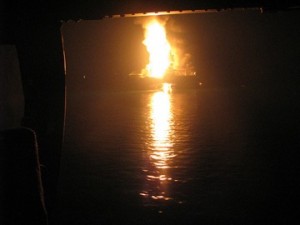Report: BP winding down oil spill cleanup
The original Deepwater Horizon fire (Pic by Deepwater Horizon Response, via Flickr) According to a plan approved by the Coast Guard and obtained by the Associated Press, BP will no longer be responsible for the cleanup of any oil washing up on Gulf of Mexico shores, unless officials can prove it came from the BP well that blew out in 2010, killing 11 workers and sending more than 20 million gallons of oil into the gulf. Via the AP : About 90 percent of the Gulf coast has been deemed clean, according to officials. The plan spells out protocol for when an area still needs to be cleaned and when BP’s responsibility for that ends.
Jul 31, 2020145.4K Shares2.7M Views
According to a plan approved by the Coast Guard and obtained by the Associated Press, BP will no longer be responsible for the cleanup of any oil washing up on Gulf of Mexico shores, unless officials can prove it came from the BP well that blew out in 2010, killing 11 workers and sending more than 20 million gallons of oil into the gulf. Via the AP:
“„About 90 percent of the Gulf coast has been deemed clean, according to officials. The plan spells out protocol for when an area still needs to be cleaned and when BP’s responsibility for that ends.
“„Louisiana officials wouldn’t give their approval because they were concerned about what they perceived as a lack of long-term monitoring in the document. They also complained that the Coast Guard gave them only five days to review the plan, according to a letter sent to the agency by Garret Graves, a top aide to Gov. Bobby Jindal for coastal affairs.
Fishermen from the Florida panhandle echoed those sentiments, telling the AP that the fish they catch don’t look the same as they did pre-spill. “It’s not OK at all. We aren’t scientists or anything, but we are out there all the time and we can tell things aren’t right,” said one, who added that many species caught off the beach pier “have oily deposits in their intestines when they are carved up for cleaning.”
Coast Guard reps said that cleanup will remain ongoing in especially sensitive areas but, for most of the gulf, cleanup will now move to the next phase: restoration. Edward Owens, a technical adviser for BP, compared the next phase to getting a “nice shine on your car,” but environmental advocates would likely disagree.
Writes the AP:
“„A bit more oil will be allowed to remain on remote wild beaches where intense cleanup could do more damage. On beaches where people live and play, BP will be off the hook once there is no visible oil or oil is “as low as reasonably practicable” to clean up.
“„Marshes will be deemed clean when there is no thick oil left or when officials decide that it’s best to let nature clean up the mess.
As previously reported by The Florida Independent, sightings of a large volume of oil were reported as recently as September. According to the Coast Guard, the recent sheen is likely a result of last year’s spill — and may be emanating from a riser pipe of the Transocean rig, whose explosion led to last year’s disaster. (That rig now sits on the ocean floor.)

Rhyley Carney
Reviewer
Latest Articles
Popular Articles
